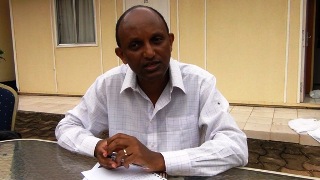Rights group accuse South Sudan Lakes state authorities of unlawfully detaining, beating civilians
June 24, 2013 (JUBA) – A US-based rights entity has openly accused South Sudanese soldiers (SPLA) of allegedly detaining unlawfully and mistreating, since February, more than 130 civilians in its Lakes state.

Soldiers, it said, rounded up dozens of young men, often detaining others if they couldn’t find the suspects they were seeking, and held them in harsh conditions for weeks or months without charge.
Witnesses told HRW that soldiers who made the arrests in February held the detainees in the Langchok military detention facility, about 10km from the Lakes state capital, Rumbek.
“At least some were severely beaten,” the body said, after it reportedly interviewed more than 15 former detainees and family members of current detainees, government officials and other witnesses to the arrests in the state between April and May.
“Having soldiers round up, detain, and beat civilians is no way to resolve conflict or to strengthen the country’s justice system,” said Daniel Bekele, Africa director at HRW.
“Civilians should never be held in military detention or subjected to this kind of illegal, inhumane treatment,” he added.
The rights body, in the statement, also accused the state governor, Matur Chuot Dhuol of stirring up the problem, citing the arrest of 50 men from each side of the two villages involved in inter-communal fight on 10 February.
The arrest, it said, occurred regardless of whether there was evidence they participated in the fighting. Many of those arrested, it added, were relatives of people who participated, but had fled.
The human rights body, however, urged state authorities to “immediately” release those in detention, or prosecute them, but ensure the process is not in violation of their rights.
“Any detainee not released, should be informed of charges against them, be given access to counsel, and brought before a judicial authority,” partly says the 24 June release.
The detainee should also be allowed to see family members and receive any needed medical treatment, it adds, while urging South Sudanese authorities to ensure that no civilians are held in military detention facilities.
The new caretaker governor was appointed early this year, after South Sudan president, Salva Kiir issued a decree relieving the elected one, Chol Tong Mayay over rising insecurity concerns.
Soon after his appointment, however, Dhuol initiated a series of security reforms in the state, mainly using soldiers and other security forces to restore order in a region awash with cattle raids.
Gun violence in Lakes state since South Sudan’s independence in 2011, according to Human Rights Watch, has resulted in numerous deaths and displacement, thus hampering development in the region.
The new governor has, on numerous occasions, been criticised for his “heavy-handed” approach to restore law and order in the state, which many claimed undermines citizens’ rights and the rule of law.
The police, according to South Sudan’s Transitional Constitution, may detain suspects for 24 hours or produce them in court, and should promptly inform suspects of the reason for the arrest and any charges.
However, none of the former detainees who spoke to HRW were charged with a crime or had met with a lawyer.
“This kind of ‘rough justice’ violates human rights and undermines the country’s fledgling criminal justice system,” Bekele said.
This example of militarized response to crime completely ignores the established laws of South Sudan, he added.
International law, the US-based rights body stressed, prohibits all ill-treatment of prisoners, including corporal punishment and prolonged chaining of prisoners, while South Sudan law also prohibits disciplinary measures that are cruel or degrading or could compromise the physical or mental health of a prisoner.
“What has happened in Lakes state should be a wakeup call to South Sudan’s government and to international donors,” Bekele said.
“The military is stepping in because the police, judiciary, and prisons are failing to meet justice needs. But the solution is to bolster the capacity of the police and prisons, not resort to a militarized response that is violating people’s most basic rights”, he added.
ARMY REACTS
But Phillip Aguer, the spokesperson of the SPLA dismissed as untrue the findings of the HRW report, which was released on 24 June.
“I think the army has tried to maintain law and restore order in a region where cattle raids are rampant. It is the duty of the army to restore calm in inter-community fights,” he told Sudan Tribune by phone.
(ST)
